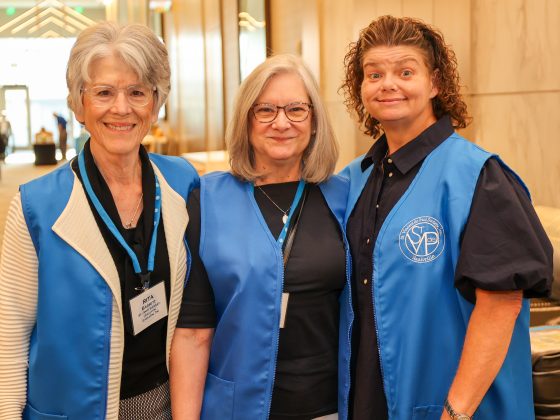“Well,” we sometimes admonish ourselves when an idea we’re discussing doesn’t seem quite right, “that’s not very Vincentian.” The phrase is a simple reminder of who we are, and how we act. It needs no further explanation. After all, our Rule finds it sufficient to say that “Visits to the Poor are made in a Vincentian Spirit.” [Rule, Part III, St. 8] The very word Vincentian carries with it a depth of meaning that conveys so much more to Members than it does to anybody outside the Society.
It isn’t that the Rule never explains what it is to be Vincentian. Throughout it, we read things such as “Vincentians feel called to pray together,” “Vincentians strive to seek out and find those in need,” “Vincentians serve the poor cheerfully,” “Vincentians endeavor to establish relationships based on trust and friendship,” “Vincentians never forget the many blessings they receive from those they visit,” and, of course, “Vincentians serve in hope.”
It turns out that our little word, Vincentian, is a very big thing. So big that if we were to make a list of all the characteristics and actions of Vincentians from our Rule and Manual, and treat as a list of instructions, it would be overwhelming.
In a similar way, if we were to make a list of all the times Jesus says things like “go and do likewise”, “as I have done for you, you should also do,” “do this and you will live,” “love your enemies,” or “whatever you did for one of these least brothers of mine, you did for me,” we would have an even longer list!
The good news is that these lists are not in conflict; Vincentian spirituality is Catholic spirituality. To be Catholic, and to be Vincentian, is not to carry these lists only in our books, but in our hearts, and in our actions. We know that to be Vincentian is always to err on the side of compassion, even though those words are not in the Rule.
Challenged by the Pharisees to pick out the greatest of the commandments, Jesus responded with an entirely new commandment, in two parts: “You shall love the Lord, your God, with all your heart, with all your soul, and with all your mind… You shall love your neighbor as yourself.” He was not dismissing the Ten Commandments, but was instead answering the “why” of those commandments.
Few Vincentians have the Rule memorized, and although we try to live it fully, most of us will fall short from time to time. That doesn’t make us any less Vincentian, as long as we remember the “why”. Our “ideal is to help relieve suffering for love alone,” and that is just Vincentian enough.
Contemplate
In serving, is my foremost motive always love of God and neighbor?




I forwarded this Contemplation to our Conference Presidents. Thank you for such a meaningful and heartwarming reminder of who we are and what we do.